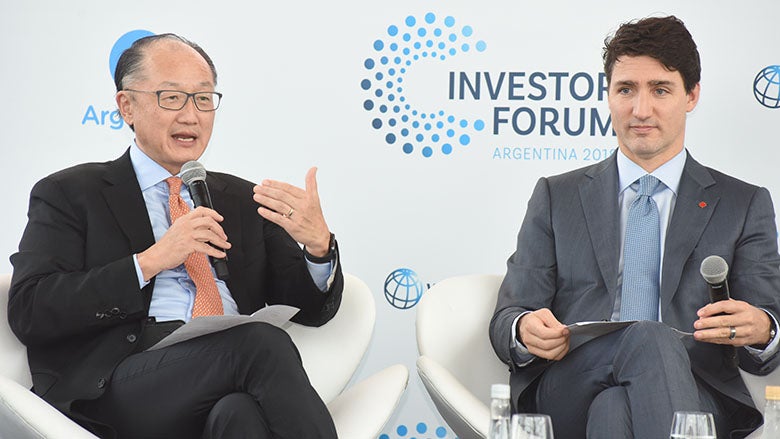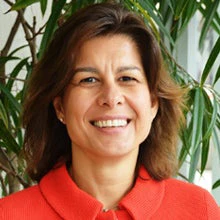 If Jyk Jt
If Jyk Jt

“Private capital is often an important source of sustainable finance. Public finance alone may not be sufficient to meet the demands for sustainable finance as the global economy continues to grow and poses increasing burdens on our resources and ecosystems. Mobilizing private investment in areas such as sustainable infrastructure, sustainable technologies and business model innovations, among others, can deliver substantive environmental, social, and economic benefits.”
This summary from the G20’s Sustainable Finance Synthesis Report was at the heart of the discussion at the Investor Forum, which was held on the sidelines of the G20 Summit in Buenos Aires in November. The event – hosted by the World Bank and the Government of Argentina – brought together investors holding over $20 trillion of assets as well as stakeholders and representatives from G20 governments. The goal was to identify steps for boosting long-term, sustainable, private-sector investments that tackle development challenges and promote economic growth in parts of the world that need it most.
The World Bank report prepared in the lead-up to the Forum highlighted that there is broad consensus that private sector investment can play a key role in addressing global development challenges. But there is also agreement that new solutions are needed to overcome obstacles to investment, particularly in infrastructure. As World Bank President Jim Kim put it when he addressed the G20 Leaders in Buenos Aires - “Aid alone won’t get us close to achieving the Sustainable Development Goals – the costs are in the trillions, but official development assistance is in the billions. We have no hope of ending poverty without private sector investment.”
The list of leaders who addressed the Investor Forum is testimony of their support to mobilizing private sector investment and the importance that is increasingly being placed on partnerships with these investors. Speakers included Argentine President Mauricio Macri, Canadian Prime Minister Justin Trudeau, Japanese Deputy Prime Minister Taro Aso, European Commissioner Pierre Moscovici, and the UK Chancellor Philip Hammond.
When it comes to financing sustainable development we all know that we must move quickly. But the Forum was not just about speeches. We initiated important discussions on how we are going to work together to move capital at scale. This is particularly important when it comes to using the power of invested capital to tackle climate change and to bring sustainable or “Environmental, Social, and Governance (ESG)” investing into the heart of capital markets.
The discussions focused on several key dimensions of sustainable investment, including fiduciary duty; avoiding short-term horizons; rationalizing reporting requirements; and impact investing. Clear, practical recommendations were made to drive the sustainable investment agenda.
- For the “Fiduciary Duty” discussion led by Fiona Reynolds, Chair of the United Nations Principles for Responsible Investment (UN PRI), the group called for national and international regulators and supervisors of banking, insurance, securities, and pensions to work together with the private sector to clarify that fiduciary duty requires the integration of material environmental, social, and governance (ESG) factors within investment processes.
- Sarah Williamson, from Focusing Capital for the Long-term, led a discussion on realigning incentives along the investment chain to encourage a long-term approach. The group’s recommendation was to address regulatory and reporting constraints that could limit advancement of long-term, sustainable investing. One concrete suggestion that emerged was to adjust capital charges to actual asset-risk profiles.
- Lady Lynn Forester de Rothschild led a discussion focusing on the Embankment Project for Inclusive Capitalism (EPIC), which is building an integrated framework for reporting for both corporates and investors that will provide the standardized non-financial information that is needed to truly embed ESG into investment considerations. This group called for support for private-sector led efforts to rationalize corporate disclosure to promote long-term investing and value creation, eliminating regulatory barriers to such disclosure and, over-time, incorporating them into international accounting standards.
- Finally, our International Finance Corporation (IFC) colleagues led a discussion on the Operating Principles for Impact Management, which have been developed by IFC to create a standard and common discipline for impact investing. The group called for an open dialogue between asset managers, asset owners, development finance institutions and policy makers, to advance the adoption of these principles.
These discussions led to clear commitments, which are enumerated in the Buenos Aires Call to Action. Our job now is to help drive these initiatives forward in our client countries – though our technical assistance, lending operations and convening power.
The participants who took part in the Forum were not complacent – we are well aware of the challenges ahead and consequences of a lack of action. We need to continue to lead and spread the word, bringing on board remaining investors who need further support and guidance to embed sustainability into the heart of their operations – as business and investing as usual is no longer an option. I look forward to working with the leaders represented at the Investor Forum to take concrete actions that will boost long-term, sustainable private sector investments that help us meet our goals of reducing extreme poverty and boosting shared prosperity.


Join the Conversation